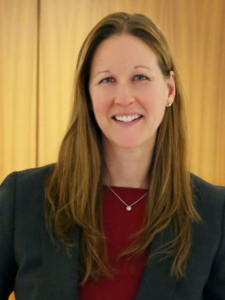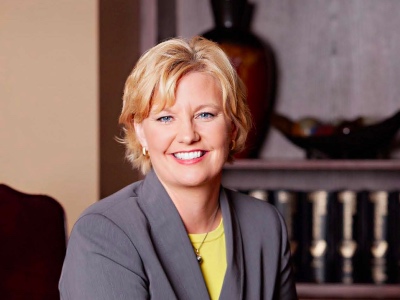“In the moment, you might think that your path in life doesn’t seem clear. It might seem like it’s going in a direction that’s not what you had planned,” says Wells Fargo’s Kelli Hill, based in Minneapolis. “I’ve learned to go with it and have confidence that life will take you right where you need to be.”
From unexpected career and personal turns to crossing the finish line at an Ironman Triathlon, Hill shares on navigating towards growth and fulfillment.
Trusting A “Zig-Zagging” Career Track
“Prior to joining Wells Fargo over eight years ago, I would have described my career path as a bit of a zig-zag road. That’s the way that I thought of it.”
While at the University of Minnesota Law School, she wanted to become a public defender. But Hill remembers sitting in a tax class one day and turning to the student next to her and saying, “Isn’t this fantastic?” The reaction she received was quite the contrary.
That was the moment she suspected this might be the field for her.
Out of law school, Hill took a job in public accounting at Deloitte & Touche. She left Deloitte (now Deloitte Tax) to practice law and spent most of private law practice in the trust & estates and business transition planning groups at Minneapolis-based, Fredrikson & Byron, PA. She enjoyed the work, the firm and her colleagues, and was learning a lot, but felt like something was missing.
“I didn’t want to look back and say, ‘I was a successful attorney and worked at a terrific firm with so many talented colleagues, but was never really completely fulfilled.’” reflects Hill.
Hill left private law practice to run the tax, trust and legal group of a single-family office headquartered in St. Paul, Minnesota. It was during her time at the family office that Hill discovered the benefits and impact that having a financial plan and, specifically doing strategic wealth planning, can have on high net worth families.
When she joined Wells Fargo as a senior wealth planning strategist in 2012, she began to see congruency in the experiences she’d accumulated and where she was going, eventually rising to a Senior Director of Planning in Wealth Management.
“I thought to myself, ‘my entire career path has been tailor-made for this role and this experience,’” says Hill. “It was no longer a zig-zag to me.”
Working with Individuals and Families
What Hill loves most about her work in wealth management (and wealth planning, in particular) is supporting and advising clients on personal and financial decisions that are otherwise difficult to make, to greater outcomes than you might even imagine.
“As a professional, when you help somebody to make financial decisions, it has a qualitative impact that often far outweighs any tax dollars saved,” she says. “It can have such profound impacts on their lives and, when that happens, the appreciation and gratitude is overwhelming.”
As an exemplary moment of this, Hill recalls working with a family to transition their business to the next generation. Her work led to conversations that, as a family, they had not previously been able to confront.
“We had this moment where they actually told each other how they felt about the business and their desired places in it,” remembers Hill, “I will never forget it.” Beyond ultimately being able to identify solutions that enabled the family to achieve their financial goals, Hill recalls this moment and how important to the family their work together had become.
Being Open and Receptive to Mentorship
“I would not be in the position I am today without having had the benefit of supportive mentors and sponsors,” Hill attests. “I’ve worked with some pretty wonderful people in my career, especially while at Wells Fargo. In fact, most of the mentors and sponsors with whom I’ve had the privilege of having were/are managers of mine.”
If you want to attain strong mentorship and sponsorship, whether you are the mentor or mentee, Hill recommends listening, being receptive and open, and most of all—being yourself. Early in her career, Hill recalls a mentor saying to her “don’t try to fake it, people will know.”
“I always try to be open to feedback, even if it stings a little. I want to continue to improve and work on my professional and personal development,” she notes. “The individuals who have become my mentors and sponsors have pointed out that my openness to feedback and focus on self-improvement are characteristics they enjoy most about working with me. The other is my being authentic, being me.”
Hill says her professional self is just who she is. These days, that includes embracing the realness of her seven year old daughter wanting to say hello to her colleagues on a Zoom call.
“This is me,” says Hill. “I always try to be my authentic self. To really connect with people —your colleagues, your clients —you have to let them see you. I’ve learned that to be a great leader, it’s a good thing to be vulnerable, authentic, natural. To be you.”
Hill also recommends implementing the advice you receive.
“It’s one thing to solicit and ask for advice and guidance,” says Hill. “It’s another thing to actually take it, and I do my best to do so and will continue to.”
Growth Through Change And Adversity
On a personal level, Hill values personal growth through challenge as well as learning through making mistakes.
In her early thirties, she experienced an unexpected divorce that shook her world.
“I took the opportunity to work through a big change in my life very seriously,” says Hill. “I remember saying, ‘This is an opportunity for me to really figure out who I am.’ It impacted my life tremendously, it was traumatic—and yet I would do it all over again, every bump, every hurdle. My life experiences have helped shape who I am today and, as painful as some may have been to go through, I appreciate them all.”
In both personal and work life, Hill is aware the road of transition can be a time of discomfort and challenge, but keeps focused on the vision.
On an organizational level, Wells Fargo has embarked on an evolution to create greater consistency around bringing financial products, services and solutions to all clients through a more horizontal structure. While the work will result in “a more effective and efficient organization for our clients and shareholders, the change can be challenging.”
“When we look back six months from now, we’ll see how we’ve transformed and know that it is right where we are supposed to be.” Hill tells her team.
Trusting Your Own Strength
Hill never for a moment doubted her own vision of being personally successful. Though she came from a single-parent household with modest financial means, Hill is proud of being the first in her family to go to college and then on to law school, which was the beginning of her career path.
While recovering from that divorce years ago, she remembers a moment of personal empowerment that taught her she was capable of anything.
A few years into her career, she was a self-confessed coach potato who realized it was time to change. The first time she put on a pair of tennis shoes and ran a single mile, it took her 14 minutes. But she was thrilled.
Then, she was hooked—training up to participate in marathons and eventually an Ironman triathlon.
“I remember crossing the finish line of the Wisconsin Ironman and thinking, ‘There is nothing I can’t do’” beams Hill, who also met her husband through the triathlon community, with whom she is raising their daughter.
Her contagious enthusiasm has encouraged several others on the running path, and she keeps up a morning workout which she loves, though being a mom is now her number one priority.
Her favorite time with her daughter is bedtime reading. It began with she and her husband reading to their daughter when she was an infant and now it’s listening to their daughter read to them—and Hill wouldn’t trade it for any finish line, not these days.
Abbot Downing, a Wells Fargo business, offers products and services through Wells Fargo Bank, N.A. and its various affiliates and subsidiaries. Wells Fargo Bank, N.A. is a bank affiliate of Wells Fargo & Company.








